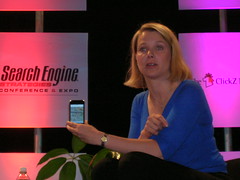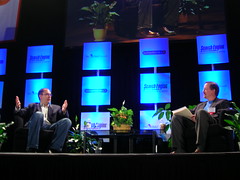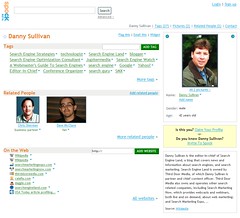Examples of Roof Ads
I thought it might be interesting to do a survey of roof ads from around the country, so here are a number of examples that can be found in online mapping systems such as Google Maps.

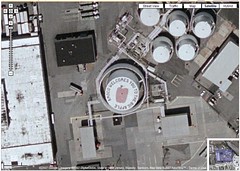
Roof Ad in New York City
If you recall, over a year ago I wrote a tongue-in-cheek post about how to optimize rooftop ads for best exposure in online maps, although some of the tips could actually be taken seriously if one did wish to market through advertising in this manner.
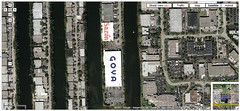
Roof Ads near Miami Airport (click to enlarge)
Now, most of the “roofvertisements” I could find were likely done with the intention of targeting promotional messages to airplane passengers, since most of the examples I can find are from buildings located near major airports. In happy serendipity for these companies, these ads are now also visible through the satellite images and aerial photos that have become table stakes for map search interfaces, so they’re getting dual use for them along with extra ad impressions. It’s pretty surprising to me that more companies haven’t painted promotional copy on their roofs, though, since I see tons of expansive, white roof “canvas” that would be ideal for this located near airports.
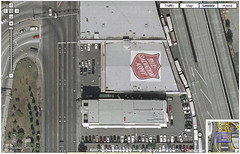
The Salvation Army in Seattle – (click to enlarge)
Click through for even more samples. (more…)
Possible Related Posts
Posted by Chris of Silvery on 08/30/2007
Permalink | |  Print
| Trackback | Comments Off on Examples of Roof Ads | Comments RSS
Print
| Trackback | Comments Off on Examples of Roof Ads | Comments RSS
Filed under: Advertising, Maps Advertisements, Advertising, Google-Maps, Guerilla-Advertising, Rooftop-Ads, Roofvertising, Satellite-Images
Google Dance
Here are some of my pix from the Google Dance last week.

Google Dance 2007 logo & party invite
Google Dance, if you don’t know, is humorously named after “Googledance” a colloquialistic term used by webmasters to describe how the Google search results used to sort of “dance around” for a few days during major PageRank or indexing updates. Google re-co-opted the term, if that’s the right word, and use “Google Dance” to refer to the annual party they throw for search engine marketing experts attending the Search Engine Strategies (“SES”) Conference every year.
Click through to see more pics from Google Dance as well as some from the SES Conference. (more…)
Possible Related Posts
Posted by Chris of Silvery on 08/27/2007
Permalink | |  Print
| Trackback | Comments Off on Google Dance | Comments RSS
Print
| Trackback | Comments Off on Google Dance | Comments RSS
Filed under: Conferences, Google Google, Google-Dance, Googledance, SES-Conference
Google Phone – ‘Gphone’ launch rumors
News is abuzz with the report that Google could launch the Gphone within a fortnight. As you may recall, I’d earlier resurrected the rumors of Google working on the “Gbrowser” – their own browser software when I learned they’d recently hired on browser security expert Michal Zalewski. I then reported a confirmation of sorts via a Wall Street Journal report, since Google is apparently working on a mobile phone browser in their Boston offices to go along with a new mobile phone they’re wanting developed.
I have a bit of insider information on this subject that might prove interesting.
Two days ago, at the Search Engine Strategies Conference in San Jose, Marissa Mayer commented on the iPhone, highlighting how well Google applications worked on it, and admiring the rich user-interface features: (more…)
Possible Related Posts
Posted by Chris of Silvery on 08/24/2007
Permalink | |  Print
| Trackback | Comments Off on Google Phone – ‘Gphone’ launch rumors | Comments RSS
Print
| Trackback | Comments Off on Google Phone – ‘Gphone’ launch rumors | Comments RSS
Filed under: Google, Mobile Search Gbrowser, Google, Google-Phone, Gphone, iPhone
Should you buy search ads for your brand keywords?
I confess, as a search engine optimizer, I used to think that buying ads for one’s own brand name was a complete waste of money. After all, all companies should rank in top slots for their own brand name(s), if they’re doing their SEO right, and if you’re ranking tops then people will be able to find you if they’re looking for you. As such, I thought that buying ads for your own name was just paying for clicks that should rightly come to you anyway.
But over time, I’ve heard other experts stating that their research shows that having ad presence for brands along with natural search ranking appears to enhance overall click through rates in a synergistic manner. And, with greater experience, I’ve seen a number of cases when companies really should be buying their own brand name keywords for ads!
I see that George Michie over at the Rimm-Kaufman Group criticized a recent Microsoft study claiming that some advertisers are wasting money by buying their own brands in paid search ads — and I think George was right to criticize this. Read on and I’ll elaborate…
Possible Related Posts
Posted by Chris of Silvery on 08/24/2007
Permalink | |  Print
| Trackback | Comments Off on Should you buy search ads for your brand keywords? | Comments RSS
Print
| Trackback | Comments Off on Should you buy search ads for your brand keywords? | Comments RSS
Filed under: Advertising, brand names, Monetization of Search, Paid Search Atlas-Study, brand names, brand-ppc, brand-search, Microsoft-Ads, Paid Search, paid-vs-natural, Pay-Per-Click, ppc
Marissa Mayer demos the iPhone at SES San Jose
At this morning’s keynote conversation between Marissa Mayer (Google’s Vice President, Search Products & User Experience) and conference co-chair Danny Sullivan, when asked some questions about Google’s interests in mobile search and wireless applications, Marissa whipped out her iPhone and showed some features and user-interface aspects that she particularly admired by pulling up Google Maps and Google Voice Local Search service on the phone:
As we recently highlighted Google’s mobile phone development project, they apparently have quite a bit of interest in the mobile space. Obviously, they consider the iPhone to have very good user-interface design, since this very nearly amounted to a product endorsement. From watching this, I’d predict that Google is likely to be in talks with Apple to see if they couldn’t partner with them in some major way in order to get prominent placement through the iPhone platform, or perhaps even to persuade Apple to develop the hardware for the Google phone on their behalf.
Possible Related Posts
Posted by Chris of Silvery on 08/22/2007
Permalink | |  Print
| Trackback | Comments Off on Marissa Mayer demos the iPhone at SES San Jose | Comments RSS
Print
| Trackback | Comments Off on Marissa Mayer demos the iPhone at SES San Jose | Comments RSS
Filed under: Google, Local Search, Maps, Mobile Search, News danny-sullivan, Google, Marissa-Mayer, Search-Engine-Strategies-Conference, SES-Conference
Keynote Conversation With Jim Lanzone
In my presentation today at SES San Jose, I mentioned that I sometimes take photos at events and then share them with the news media – here’s one of the pix that I shot of the Keynote Conversation with Jim Lanzone. Jim Lanzone is Ask.com’s CEO, and conference co-chair Chris Sherman interviewed him for the Keynote.
If you’re writing a news story about this keynote, I’d be happy to supply you with permission to use the photos I took of the Keynote, in return for a credit line and a link back to the photo’s page on Flickr. Here’s some of the other images from this sequence.
I’m tired of this camera with it’s too-slow exposures — I’m planning to ditch it for something that’s more flexible in settings and which performs better in low lighting situations.
Possible Related Posts
Posted by Chris of Silvery on 08/22/2007
Permalink | |  Print
| Trackback | Comments Off on Keynote Conversation With Jim Lanzone | Comments RSS
Print
| Trackback | Comments Off on Keynote Conversation With Jim Lanzone | Comments RSS
Filed under: News Ask.com, Chris-Sherman, Jim-Lanzone, search-engine-strategies, search-engines, SES-Conference
SES Session on Universal & Blended Vertical Search
I’m busy attending this year’s Search Engine Strategies Conference (SES) in San Jose, but I thought it’d be worthwhile to pause for half a minute in the flurry of sessions and networking to mention a couple of interesting things I heard from Google in yesterday’s session on Universal and Blended Vertical Search.
Possible Related Posts
Posted by Chris of Silvery on 08/21/2007
Permalink | |  Print
| Trackback | Comments Off on SES Session on Universal & Blended Vertical Search | Comments RSS
Print
| Trackback | Comments Off on SES Session on Universal & Blended Vertical Search | Comments RSS
Filed under: Best Practices, Google, Searching David-Bailey, Google, Google-Universal-Search, search-engine-strategies, SES-Conference, Universal-Search, Vertical-Search
Google Browser Development Confirmed
At the end of July, I wrote that it looked like the Google Browser might actually be in the works after all, based upon their recent hire of a browser security expert. I now see this in this Wall Street Journal article from August 2nd about Google’s push into creating their own wireless phone that they are indeed working on a browser — built specifically for these proposed cellphones:
“Now it is drafting specifications for phones that can display all of Google’s mobile applications at their best, and it is developing new software to run on them. The company is conducting much of the development work at a facility in Boston, and is working on a sophisticated new Web browser for cellphones, people familiar with the plans say.”
Could this be what they’ll have that browser hacker working upon?
Possible Related Posts
Posted by Chris of Silvery on 08/16/2007
Permalink | |  Print
| Trackback | Comments Off on Google Browser Development Confirmed | Comments RSS
Print
| Trackback | Comments Off on Google Browser Development Confirmed | Comments RSS
Filed under: Google, Local Search, Mobile Search, News Geolocation, Google, Google-Browser, GPS, Mobile Search
Google News comments likely to be panned by major corporations
Google today introduced a new experimental feature in their News – they’ve added story participant comments into their listings of stories.

I think it’s a cool idea, since it invites more community participation in story threads – sort of an evolutionary step on the old threaded format of the old Usenet layout paradigm. If you’ve ever had a story written about you in news media, and were disappointed to see that the reporter made a mistake or neglected to mention something that you felt was important, this would be a convenient route to mitigating it.
But, from what I’ve seen commonly happening in the contemporary business community, I’d bet that most of the major, publicly-traded companies will not engage in commenting on stories about themselves. Read on and I’ll describe… (more…)
Possible Related Posts
Posted by Chris of Silvery on 08/08/2007
Permalink | |  Print
| Trackback | Comments Off on Google News comments likely to be panned by major corporations | Comments RSS
Print
| Trackback | Comments Off on Google News comments likely to be panned by major corporations | Comments RSS
Filed under: Google, News blogging, Google-News, user-generated-content
New Breed of People Search Engine Launches: Spock.com
A little startup called Spock.com has moved into public beta today for their official public launch – previously they were only available to a handful of invite-only beta-testers. Spock is to white pages what Google Maps was to yellow pages – Spock is a sort of people search engine that pulls data from many different sites together to automatically form personal profiles of individuals. The service also allows one to search for people who match up with certain criteria like celebrities, kidnapped children, billionaires, sudoku fans, “journalists killed in Iraq”, “Baptist women who love to travel”, etc.

Spock is one of a new breed of people search engines which pulls data in from a variety of online sources including MySpace, LinkedIn, My Yahoo!, Wikipedia, company websites, blogs, and other sources to compose these composite profiles which include photos, descriptions, links to people related to the person in question, and tag lists of common keywords. Check out this search I did for “Danny Sullivan”:
And, here’s the profile Spock generated for the search engine marketing “Danny Sullivan”:
This automatic generation of profiles from other data sources, similar to a meta search engine, is not all that new, of course – ZabaSearch has been touted for doing similar stuff to compose info on people out of various public records, sort of like a poor man’s background search. And, ZoomInfo has worked to build a directory of searchable business profiles of individuals. IceRocket also used to have a metasearch engine that pulled in data from a handful of various singles/personals sites.
What makes Spock a bit different is how they’re actively composing these profiles from sources that really haven’t been associated with one another previously, and making them publicly available, for “free” (eventually paid for by ad revenue, of course). While the general public likely hasn’t been aware of it, the CIA or NSA has actually also been working on a similar sort of search engine system which automatically composes secret dossiers of information on individuals from a multitude of sources including credit card information, criminal databases, as well as many of the same online sources used by these web services like ZabaSearch, ZoomInfo, and Spock.
Possible Related Posts
Posted by Chris of Silvery on 08/08/2007
Permalink | |  Print
| Trackback | Comments Off on New Breed of People Search Engine Launches: Spock.com | Comments RSS
Print
| Trackback | Comments Off on New Breed of People Search Engine Launches: Spock.com | Comments RSS
Filed under: General, Research and Development, Searching people-search, privacy, privacy-concerns, spock, white-pages
